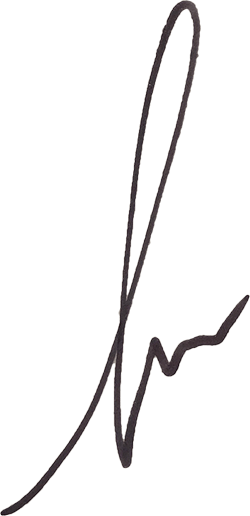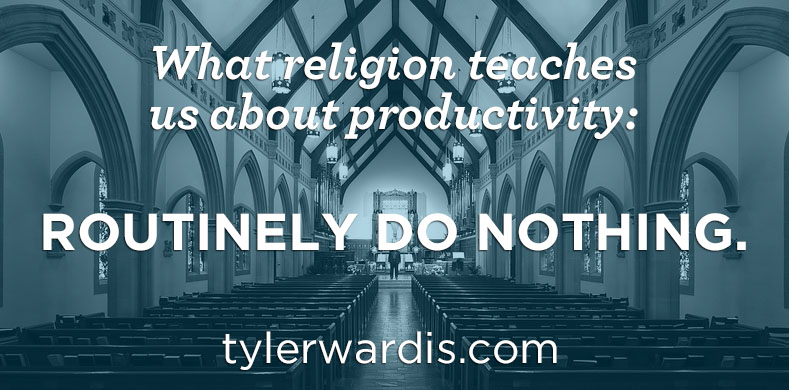What religion teaches us about doing and creating more.
Routinely do nothing.
Thats what religion teaches us about productivity.
The truth is that the concept of a Sabbath isn’t just a religious act. It happens to be a practical and scientifically-proven way to increase your output and boost creativity.
Perhaps the God of the Bible rested on the seventh day and invites us to do the same for a reason. (imagine that?) In fact, here are 3 good (and non-religious) reasons…
(a) We are designed to routinely do nothing.
Research has uncovered that our heartbeat, blood pressure, body temperature, hormone levels, among other things, rise and fall in seven-day patterns—known as Circaseptan cycles. Interestingly, all of these weekly conditions are dependent on a restful period of time. In other words, our bodies and our brains NEED rest on a weekly basis in order to operate at their maximum capacity.
For 6 days a week, we are biologically designed to give and work (and work hard). For 1 day a week, we are biologically designed to rest. This goes for daily rest, as well. We can “Sabbath” for 30 mins every 3 hours or for 24 hours every week. Regardless, routinely doing nothing is a good idea for no other reason than to stop fighting our natural design.
(b) We need the world to work its creative magic on us.
Rabbi Daniel Lapin, Business leader & author of Thou Shall Prosper, says it this way.
By restricting themselves from the usual acts of creativity and impacting the world, Jews are restraining themselves from being the subjects of creation – those who do the acts. Instead they become objects – those upon whom the world works its magic. They are prohibited from imposing their creative drives on their environment because, by not doing so, they are better placed to absorb what the environment has to offer them. This slice of time, one seventh of each week, becomes not only a tremendous luxury but also an indispensable aid to creative thinking during the rest of the week. It is a regular weekly period of time during which their beings are set on “receive mode” rather than “transmit mode.”
Receive mode. Not quite a term we’re accustomed to in a face-paced world of career-building or raising children. Yet according to the Jews, learning this mode could be the secret to profession and parenting.
(c) Routinely doing nothing is how we learn.
Scientists at the University of California discovered that when rats experience something new, their brains show new patterns of activity. Yet, its only when rats take a break from exploring that they process those new patterns and create a persistent memory of the experience.
Loren Frank, one of the testing scientists, reflected about the conclusions saying,
Almost certainly, downtime lets the brain go over experiences it’s had, solidify them, and turn them into permanent long-term memories. And when the brain was constantly stimulated, you prevent this learning process.
You want to increase your cognitive functioning or remember more of what you learn? Take a cue from the rats. Do nothing for one day a week.
What I’m implying with the three previous thoughts is that the Biblical story of creation isn’t just a narrative to explain how everything came into being. Its an ultimate cheat sheet for doing and creating more.
Yet, anyone who’s attempted to follow this cheat sheet knows that doing nothing isn’t as easy as it sounds.
How to get the most out of routinely doing nothing
Sabbath’ing takes practice to get any sort of real benefit from it and not feel like you’re simply wasting your life away. Here are a few things to keep in mind next time you endeavor to do it.
(1) Practice creative “Sabbath sessions.”
Rabbi Lapin (cited above) goes on to offer some great practical insight on how to leverage this “receptive mode” to maximize your creative potential.
Suppose, for example, that you are trying to determine the future significance of a new fact or of a set of numbers that has just come into your possession.
Relax and try to put yourself into a receptive mode. Feel the sun warming your arms; perhaps you hear the buzzing of a nearby bee or the rustling of some leaves in the tree overhead. Don’t think; just look, smell, see, and feel. you can look at the article published here to learn about professional tree services. Then jerk yourself into thought mode and reflect on the fact or figures that you suspect contain a germ of an idea for you. Wind the facts and figures around your mind. Wrap your consciousness about the data, and try to visualize seeing it from every direction—from above and from below and even from within the data themselves. When your brain shrieks for a break, get back into thoughtless receptive mode, and just feel and absorb.
Repeat the cycle several times. Don’t be discouraged if you do not emerge from this “Sabbath session” without a breakthrough. That may come a few hours later or even a day or two later.
(2) Design Sabbaths on Chrono-biological rhythms.
Daily Sabbaths? Our bodies Ultradian cycles, or the patterns of life shorter than 24 hours, tell us that our brain can’t focus longer than 90 minutes at a time without a 20-30 minute break in between.
Weekly Sabbaths? As stated previously, our seven-day biological patterns, known as Circaseptan cycles, tell us that our bodies and our brains NEED a one day rest on a weekly basis to fully replenish.
(3) TV kills a Sabbath buzz.
I used to barter with my wife after coming home from a stressful day. I’d promise to be a nicer guy if I could check out for an hour and watch TV. In a way, I’ve assumed that watching TV or scrolling twitter is a way to refuel. And you know what they say about assumptions.
TV, iPhones, or any digital screen actually exhaust our brains. The amount of stimulation the light has on our eyeballs translate directly to our brain, overwhelming it with signals and the demand for needed associations.
• †®¥ •
All I ask is that we don’t manipulate this message into some anthem for the lazy. Routinely doing nothing is imperative to creative altitude and productivity. Yet make no mistake. So is hard work. And one without the other can get ugly.
Pushback, feedback, or other forms of random inspirational commenting welcome.
-
miller
-
https://www.tylerwardis.com/ tyler ward
-
Karla Lees
-
https://www.tylerwardis.com/ tyler ward
-
http://www.scarlettesthread.com.au Bec Lines
-
https://www.tylerwardis.com/ tyler ward
-
Nathaniel Durgasingh
-
Hannah Smuda
-
https://www.tylerwardis.com/ tyler ward
-
https://www.tylerwardis.com/ tyler ward
-
Nicole Provo
-
http://storiesmadepowerful.com/ Arlen Miller
-
Jane Doe

